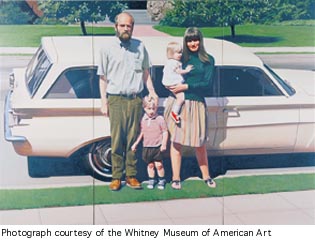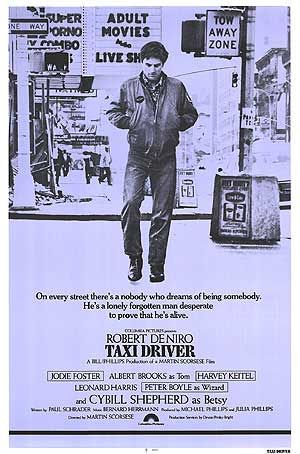
Nick Lowe, “Hope for Us All”
I’m not thinking about this song from Nick Lowe’s latest album, At My Age, necessarily, although it’s a song I like hearing a second time whenever I spin it once. The reason it’s being used as a part of this post is because of two Academy Award-nominated films I’ve seen over the last month, No Country for Old Men and There Will Be Blood. It’s not even the movies themselves that I wish to discuss, but for fear of SPOILING any plot elements for Townspeople who have not yet seen these fine movies and would like to do so without knowing too much about them in advance, let’s pick up this discussion after the jump.

I’ll get my thoughts on the films out of the way here, because they lead to a curiosity I have regarding today’s music, too much of which rolls past me for too many reasons, but one, perhaps, that I’d like to examine.
I am a big fan of Coen brothers movies, at least up to a point. I haven’t seen an outright killer of a film from them in some time. O Brother, Where Art Thou, a fun romp with great use of music and a reference to one of my favorite Preston Sturges films, is the best I’ve seen of their movies since the mostly brilliant, early run that ended with Fargo. It seemed that No Country for Old Men would be their comeback, in my book. I’d read it dealt with Big Themes in a Serious Manner. Well, I saw the movie, liked it a good deal, appreciated the craft with which it was made, and ultimately left the theater scratching my head at the Point of the movie’s underlying Lack of Meaning. Life stinks and then a serial killer with a Pete Rose hairdo pops you with a blast of compressed air. No shit! As much as I enjoyed Javier Bardem‘s super-duper bad guy and gleefully cheered on his string of cold-blooded killings, by the end of the film I felt I’d been caught looking at a snuff film – and liking it! It’s fascinating to observe what the mirror does, all right.
About 45 minutes into Paul Thomas Anderson‘s There Will Be Blood I leaned over to my wife and said, “This is the kind of movie Scorcese used to make but can no longer make!” I was thrilled. I loved the Look of the movie, I thought Daniel Day-Lewis and the boy who played his son were fantastic. Paul Dano‘s preacher character was totally creepy! The historic details and possible modern-day prescience of the Upton Sinclair novel/commentary by Anderson were interesting to contemplate. I was loving this movie right up until the final scene.
Now I warned you that I might SPOIL plotlines for you, so even though I’ll try to keep it vague, this is your last chance to turn your eyes…
OK? The final scene, you’ll recall if you’ve seen the film, is especially gruesome. Plainview, Day-Lewis’ character, is in complete Miserable Wretch mode when Eli, the minister played by Paul Dano, comes a-callin’. Eli’s also in Miserable Wretch mode, although this is not as evident. He does however pour himself two whiskeys before trying to play his trump card in his long-running negotiations with Plainview. In short time, Plainview reveals that he’s already drank his milkshake. Much yelling ensues while Eli quivers cowardly. Finally Plainview is poised to do The Unspeakable.
I’m not typically a big fan of Miserable Wretch endings. It’s a plot device that I often find as rote as drawn-out courtroom scenes. Usually, it’s already been well-established that the Miserable Wretch has fallen, that his or her ambitions added up to a hill of beans, that he or she misses his or her childhood sled. However, there are times when the credits roll and the main character is left mumbling “The horror…the horror…” and I’m feeling the horror right alongside that character. Other times, perhaps it’s me reading into the situation, but I find some hope in a Miserably Wretched ending. That last Stanley Kubrick film, Eyes Wide Shut, comes to mind. Was I the only person in the theater who found the final seconds of the movie heartwarming and even reassuring to the institution of marriage?
In his prime, no director was more effective at lifting the Miserable Wretch from his misery than Martin Scorcese. The master at dragging his main characters to the depths of humanity, Scorcese, with his whole Catholic redemption point of view, couldn’t help but provide hope for us all. Even his most brutally wretched character, Travis Bickle, is played as a redeemer of sorts, even if self-proclaimed. Scorcese believes in humanity and believes in his characters. The more time that passed following the end of There Will Be Blood, the more I was bummed that Anderson took what I felt was the easy way out. We’ve all loved our share of vague, amoral Peckinpah and Cassavettes endings. There are times when they are appropriate, when The Horror is all that’s left. I felt Anderson’s ending for There Will Be Blood cheated the Plainview character of his dignity and humanity. The guy surely went over the top and lost his soul, but I felt his character was more than a Soul-less Beast. At the same time, it started to bug me how thinly the preacher was written. I watch televangelists for sport probably more than most of you, but I’m also a subscriber to Neil Young’s “Even Richard Nixon has got soul” line, from “The Campaigner”. It occurred to me that Eli had no soul, or hadn’t demonstrated an ounce of it through the movie. I continue to grow bugged by what I perceive to be a lack of moral center and/or maturity in the film’s director. (I’m sure he cares as he prepares to receive his deserved handful of Oscars – no joke, despite these little beefs, which took the movie from a strong A to an A- for me, it’s pretty great and well worth your time, even now that I’ve spoiled it for you.)
So, I’ve concluded that I’m an -ic or -ist of some sort (maybe even an -ick, but that’s for another discussion). I’m sure some of you with a better command of our language and archetypes knows exactly which one I am. I generally like to feel that there’s a point to life, and if there’s not one – which I honestly am skeptical that there is – I feel it’s my responsibility – our responsibility – to create a reason or two. I said I wanted to relate this to music today, but considering there aren’t enough modern-day lyricists I can quote, I’ll leave it to you to tell me if this is becoming a part of songwriting culture as well as screenwriting. I can think of countless rock songs that I love that take a hard view of the world and/or a character but deliver a final verse that is appropriate to the hope and dignity due us all.

